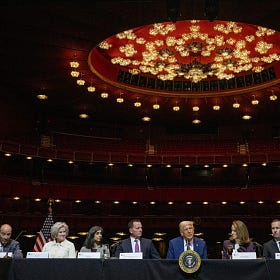The Failed Sequels of Great Inventors
Call it the Sophomore Slump
CT Jackson is a former U.S. government lackey turned humorist and author of two satirical books, as well as the newsletter Madcap. He is persona non grata in over 30 countries and spends his time in Germany.

Human history is filled with inventors whose contributions forever changed civilization. But surprisingly, these innovative minds don’t always knock it out of the park their second time around. Here’s a brief history of those failed sequels.
3500 B.C.E.
When Ebied of Mesopotamia attached two wheels to a cart, transportation was forever changed. But then Ebied, ever the clinger, invented the third wheel—which led to a slew of awkward dates across the Fertile Crescent.
2600 B.C.E.
The Egyptians constructed the Great Pyramid of Giza, an enduring marvel of engineering. Looking to build on the geometric success of their original, they then invented the cubicle. Stone workers of the time collectively agreed that this innovation was not as good as the corporate pizza party.
508 B.C.E.
Athens invented democracy, a revolutionary new system that gave citizens a voice in governance. Two years later, they invented gerrymandering in order to split the “philosopher vote.” Socrates lost in a landslide, and governance was forever changed.
45 B.C.E.
Julius Caesar implemented a new solar calendar to replace the ten-month Roman calendar. One year later, he participated in “Backstab Your Boss Day.” Historians agree that this was largely a corporate holiday fabricated to sell greeting cards.
1088 C.E.
Bologna established the first university, creating a formalized system of higher education and amazing parties. Unfortunately, one year later, they invented tuition loan applications.
1440 C.E.
Johannes Gutenberg developed movable type, which allowed for printing literature, religious texts, and dirty magazines at an unprecedented pace. But after the economy took a nosedive, Gutenberg also invented the ransom note—and was quickly caught, since he owned the only printing press in Germany.
1876 C.E.
Alexander Graham Bell invented the telephone, forever transforming human communication for people over 40 years old. Just days later, he invented the “work call,” an innovation that helped my boss ruin my vacation to the Poconos. Thanks, Alexander.
1903 C.E.
Orville and Wilbur Wright became the first men to fly an airplane anywhere other than Splatsville. A few months afterwards, the brothers began charging baggage fees on flights out of Kitty Hawk.
1945 C.E.
The United Nations was formed in a bold attempt to foster global peace, cooperation, and flag-collecting. Within weeks, its leaders also invented the strongly-worded letter, which has stopped zero wars and counting. They aren’t angry, just disappointed.
1991 C.E.
Tim Berners-Lee invented the World Wide Web, opening up humanity’s access to limitless information, but mostly nudity. Shortly afterwards, Berners-Lee’s band The Cacophony recorded their only big hit, “Dial-Up Internet Noise.”
2007 C.E.
Steve Jobs introduced the Apple iPhone, reinventing the way mankind ignores each other in real life to play word games. The following year’s release of the iColonic was met with mixed reviews at best.
MORE GUEST POSTS
Coming Soon to the Kennedy Center!
Thanks to our deep network of connections inside the beltway, Chortle has discovered a draft list of further Kennedy Center events planned for the next few months. Get ready to celebrate America—our Golden Age is Here!
No One Understands the Artistic Pain of Butcher's Block
I used to be the Rembrandt of the cold cuts aisle. Honestly, it could get embarrassing. People would clutch my arm in the street and say, “Your veal escalope changed my life.” I couldn’t leave the house without signing someone’s chorizo.
10 Good Points That Aren't Worth Making
Most of us want to be useful. That’s why, when we see people struggling with easy questions or laboring under obvious misconceptions, we try to help them out. But in today’s polarized culture, even good advice can be a lightning rod.







Inventing the office cubicle was a regrettable choice. What those 100,000 workers in the Egyptian desert were clamoring for was a water cooler.
Worst sequel yet: After inventing the electric motor, Nikola Tesla went back into his Transylvanian laboratory and invented Elon Musk.